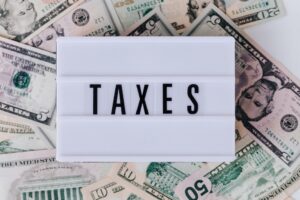Escrow does not automatically pay property tax; homeowners are responsible for paying property tax directly. Property tax payments are not handled by the escrow account and are the homeowner’s responsibility.
Escrow accounts are primarily utilized to collect funds for a property’s insurance and mortgage payments, ensuring they are paid on time. While escrow accounts offer convenience and help prevent missed payments, property taxes are typically paid separately by the homeowner to the appropriate tax office.
Failing to pay property taxes in a timely manner can result in penalties, interest, and even liens on the property. It is important for homeowners to budget accordingly and make prompt property tax payments to avoid any potential complications.
:max_bytes(150000):strip_icc()/document-with-title-escrow-agreement--687013664-bf0c2918820648dd9125ee95e82d62e6.jpg)
Credit: www.investopedia.com
Table of Contents
The Role Of Escrow In Property Taxes
Escrow plays a crucial role in handling property taxes. Wondering how it works? Let’s dive in. Escrow acts as a third-party intermediary, responsible for collecting and distributing funds for property tax payments. Using escrow for property tax payments has its benefits.
Firstly, it ensures that property taxes are paid on time, preventing penalties and potential liens on the property. Additionally, escrow allows for predictable monthly payments, making it easier to budget for property taxes. However, there can be potential issues with escrow payments.
For instance, there may be discrepancies in the estimated tax amount, leading to overpayment or underpayment. Also, changes in property tax rates or assessment values can impact the escrow account balance. Therefore, it is important to monitor the escrow account and communicate any changes to ensure accurate payments.
Overall, escrow simplifies property tax management, providing peace of mind for homeowners.
How Does Escrow Work For Property Taxes?
Escrow is a process that ensures property tax payments are handled smoothly and efficiently. In simple terms, it works like this: When you pay your mortgage each month, a portion of that payment is put into an escrow account. This account is managed by your lender and is used to pay property taxes on your behalf.
The idea behind escrow is to spread out these tax payments over time, making it easier for homeowners to budget for them. So, when your property taxes are due, your lender will withdraw the necessary funds from the escrow account and promptly pay your bill.
It’s important to understand that using escrow for property taxes is not mandatory, but it can be a helpful option for many homeowners.
Benefits Of Using Escrow For Property Tax Payments
Escrow provides several benefits for property tax payments. Firstly, it offers convenience and ease by automating the process. Secondly, it ensures timely and accurate payments, eliminating the risk of late fees or penalties. Additionally, using escrow for property taxes provides peace of mind and financial protection.
It allows homeowners to set aside funds for tax payments, reducing the chances of financial strain. With escrow, property owners can focus on other aspects of homeownership without worrying about tax deadlines. It is a hassle-free way to stay on top of property tax obligations.
By utilizing escrow, homeowners can simplify their financial responsibilities and enjoy a smoother property tax payment experience. Trusting escrow for property tax payments brings efficiency, security, and peace of mind to homeowners.
Potential Issues With Escrow Payments For Property Taxes
Escrow payments for property taxes may not always be a smooth process. Delays or errors can occur, causing potential issues. One concern is escrow shortages, which can impact property tax payments. Disputes and challenges may arise, requiring careful handling. It’s important to be aware of the potential problems that can arise when relying on escrow to pay property taxes.
Being proactive in addressing any issues that arise can help ensure that property tax payments are made on time and accurately. By staying informed and taking necessary steps, homeowners can navigate these challenges and avoid unnecessary complications. Dealing with escrow payments for property taxes requires diligence and attention to detail, but it is possible to address any potential problems and handle them effectively.
Frequently Asked Questions On Does Escrow Pay Property Tax Automatically?
Does Escrow Always Pay Taxes?
Escrow does not always pay taxes.
What To Do If Your Mortgage Company Doesn T Pay Your Taxes?
Contact your mortgage company immediately and inform them about the unpaid taxes. Request them to address the issue promptly.
Should I Pay My Homeowners Insurance Through Escrow?
Yes, it is advisable to pay your homeowners insurance through escrow for convenience and to ensure coverage.
How Are Property Taxes Handled At Closing In Texas?
Property taxes in Texas are usually handled by the seller, who pays them up to the date of closing.
Conclusion
Escrow services can offer convenience and peace of mind when it comes to managing property taxes. By automatically setting aside a portion of your mortgage payment into an escrow account, you can ensure that your property taxes are paid on time without any stress or additional effort on your part.
This arrangement eliminates the risk of forgetting to pay your property taxes or falling behind on payments, which can lead to penalties and even potential foreclosure. However, it’s important to understand the specifics of your escrow account and stay informed about any changes or adjustments.
Make sure to review your escrow statements regularly and reach out to your lender if you have any questions or concerns. Ultimately, escrow can be an effective solution for simplifying and streamlining the process of paying property taxes, giving homeowners more time and energy to focus on other aspects of homeownership.
